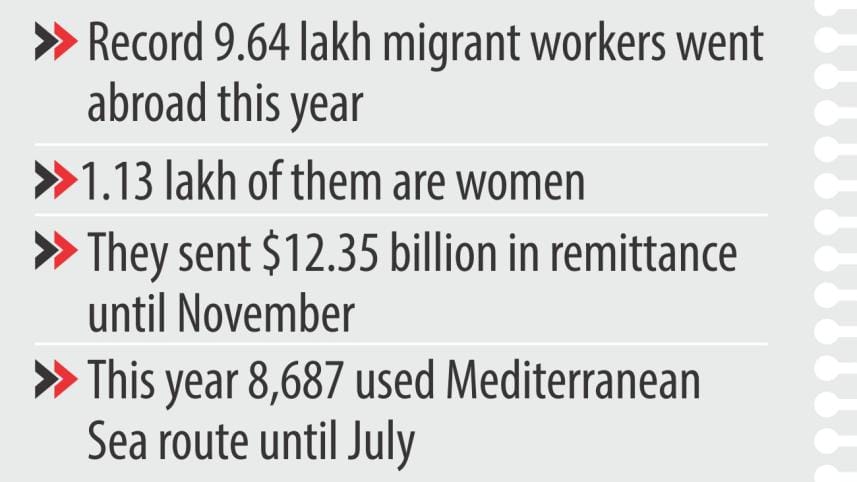Migration for Bangladeshis: Still fraught with trafficking risks

The number of Bangladeshis working abroad is increasing every year but their safe migration still remains a big challenge for the government, posing a threat to the country's top remittance-earning sector.
Stories of their abuses and other sufferings hit the headlines quite often. In most of the cases, human traffickers trick them into making the dangerous sea journey cashing in on their dreams of having lucrative overseas jobs.
Talking about the ways of solving the problem, experts have stressed the need for introducing a reform to the relevant government institutions, laws and policies. They said it was also necessary to make the middlemen accountable as the brokers, despite resorting to fraudulent means, remain off the hook taking advantage of the loophole in the law.
Amid such a situation, the world, including Bangladesh, is observing the International Migrants Day today with the theme -- “Safe Migration in a World on the Move”. Several government and non-government organisations have planned different programmes to mark the day.
Bangladesh sent a record 9.64 lakh migrant workers abroad this year, Salim Reza, director general of Bureau of Manpower, Employment and Training, told a dialogue recently. Of them, 1.13 lakh were women. BMET data show the Bangladeshis sent $12.35 billion in remittance this year till November.
Despite this feat, they become the easy targets of the traffickers, largely due to the absence and enforcement of relevant policies.
Bangladeshi workers in the Gulf states continue to report being deprived of food and forced to endure psychological, physical, and sexual abuse, says Human Rights Watch's World Report-2017. In some cases, such abuses amount to forced labour or trafficking. Some Bangladeshi domestic workers pay high recruitment fees and take out loans in order to migrate, the report says.
International Organisation for Migration says it helped at least 165 Bangladeshis as of May this year to return from Libya. Forty-three of them, who received IOM assistance in May, were detained by the Libyan authorities for not having valid travel documents, work permits or visas.
IOM has also reported that at least 8,687 Bangladeshi migrants used the deadly Mediterranean route to reach Europe till July this year.
Prof Tasneem Siddique, founder chair of Refugee and Migratory Movements Research Unit, said safe migration of a worker means the person is not subjected to any fraudulence, he or she gets expected salary and social protection at the destination country and leads a secured life on return home.
Although significant number of migrant workers is going abroad each year, little has been done for solving their problem involving their expected salary and social protection. At times it was seen that bilateral agreements were not “honoured” as workers were sent to other countries on “low quality” visas, she said.
The government is working to ensure the welfare of the workers through a dedicated ministry but it could do little to protect them from the clutches of illegal brokers, she told The Daily Star over phone.
“Time has come to formalise the 'broker system' and make the brokers accountable for fraudulence,” said Prof Siddique.
The Transparency International Bangladesh has said around 90 percent of five lakh Bangladeshi male workers had to pay two to three times the usual migration cost in 2016 to obtain work visas for seven countries -- Saudi Arabia, Oman, Qatar, Singapore, Malaysia, the UAE and Bahrain.
Tanzimuddin Khan, a Dhaka University associate professor of International Relations, said the government needs to decentralise its migration process for the wellbeing of aspirant migrant workers at grassroots. It also must make unscrupulous recruiting agencies accountable for misconduct.
Effective functioning of district-level employment and manpower offices is required while similar offices can be set up at upazilas, he said.
He pointed out that despite being a key lifeline to the country's economy, migrant workers are deprived of their due recognition largely because of their identity as “blue-collar and poorly-educated workers”.
Only a handful of the troubled workers are getting help in making it to their home.
Migrants' welfare organisation Ovibashi Karmi Unnayan Program (OKUP) provided return and reintegration support to 382 migrant workers in 2016, with 188 incidents referred by the Bangladesh embassy in Lebanon followed by 177 incidents informed by the migrants' families at home.
Bangladesh High Commission in Malaysia, local NGOs, and migrant communities in destination countries also referred some cases, says OKUP annual report, 2016.
This support included airport pick-up of 57 migrants who returned back home with critical conditions due to sickness and other problems, assistance to 45 families of deceased workers, shelter home service to 56 women migrant workers, some of whom returned with either physical or mental sickness, health support to 56 returnees, and legal support to 168 returnees, says the report.
Shameem Ahmed Chowdhury Noman, joint secretary general of Bangladesh Association of International Recruiting Agencies (Baira), said they were working to ensure decent migration of workers through holding awareness programmes and seminars regularly.
An organisation of over 1,000 recruiting agencies, Baira's one of the goals is to ensure migrant workers' transactions through proper banking channel so that they do not have to face any fraudulence and the migration process turns to be friendly, he said.
“Migrant workers have to be aware as well, as Baira alone cannot ensure their wellbeing,” he added.
This correspondent yesterday called BMET Director General Salim Reza, and Nomita Halder, acting secretary, Ministry of Expatriates' Welfare and Overseas Employment, but could not reach them for comments on the issue.

 For all latest news, follow The Daily Star's Google News channel.
For all latest news, follow The Daily Star's Google News channel.
Comments